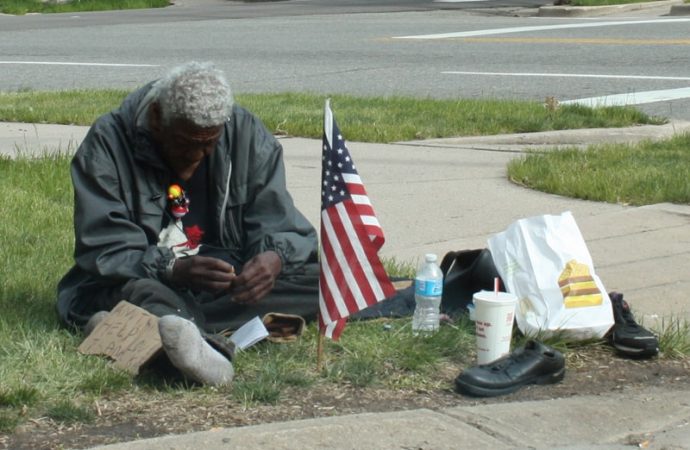by Jon Caldara
Poop.
There’s a basic tenet in public policy. What you tax, you get less of. What you subsidize, you get more of.
So, it’s no wonder we’re getting more crap. John Hickenlooper incentivized it. Oh, I’m not speaking figuratively here. I’m talking about the real stuff. I’ve helped clean it up.
The Independence Institute, that freedom-loving bastion which I run, owns a beautiful building just blocks from the state Capitol. We are very proud of this special place and even do our part contributing to public art with a life-sized, bronze statue of Thomas Jefferson by famed Colorado sculptor George Lundeen.
But like many of our neighbors dealing with the increasing onslaught of homeless camping out on our property, we’ve had enough of cleaning up their trash, liquor bottles, syringes, vomit and, yes, their fecal matter.
I know what you’re thinking: The poop is likely just some editorial comments about our work left by members of the teachers union. But our security cameras capture the acts, and, apparently, there are some things even union thugs won’t do.
Yes, to battle the uninvited squatters we’ve had to pay for security cameras. We’ve also paid to beef-up outdoor lighting, rearranged landscape to make the place less sleep-friendly, and hired security people to come around at night. It’s another example of how we have to pay, even beyond what we pay in taxes, to deal with the problems that government won’t fix and even makes worse.
Just like there’s no one in American who doesn’t have health insurance since Obamacare mandated it, let’s remember homelessness in Denver ended over a year ago!
In 2005, Mayor Hicklenlooper launched Denver’s Road Home, a well-intentioned initiative to end homelessness in 10 years. And like President Johnson’s Great Society or Stalin’s famed 10-year plans, it has only made problems worse.
According to the city auditor’s review of Denver’s Road Home, we have increased spending on the program from $568,000 in 2004 to $6.6 million in 2014. That’s near a 12-fold increase.
And those numbers don’t include services from scores of private charities and other governmental services like the city’s new poop-truck.
Poop-truck, you ask?
Less than a hundred feet from our office every day the city drives up and parks a specially made trailer with three very comfy bathrooms. We’re not talking port-a-potties here. These are well-lit, air-conditioned rooms with running water and a small office in between the stalls where one lucky employee sits all day to record how many people come in to relieve themselves. Please think of this good soul next time you’re complaining about your job.
The poop truck is powered by a portable gasoline generator, which is odd given that the city could just run a power cable a few feet to a light post, but I’ll leave that gripe to the enviros.
I understand that homelessness is a very complex, multi-faceted and difficult issue. I’m just offering up the simple reality-based observation that the more we have to deal with the mess, the cost, the crime and the downright plain ugliness, the more we lose any sympathy we had for the homeless, who truly deserve our sympathy and help.
You can see this effect in the drop in private donations to Denver’s Road Home, which were $4.6 million in 2008, down to only $535,000 in 2014.
Now, as governor, Hick is proposing we spend over another $12 million a year to do more of the same, this time coming from the state via marijuana taxes. That will almost triple what we’re spending now, but this time without that embarrassing Mission Accomplished deadline.
We can argue whether or not police sweeps, camping bans, and legalized pot help or hurt the problem. But one thing is for sure — the more money we’re spending, the worse the situation has become.
It’s time to use that money to clean up our once beautiful, and poop-free, city.
Let’s admit Denver’s Road Home has hit the end of the road.
This article originally appeared in the Denver Post, December 10, 2016.








